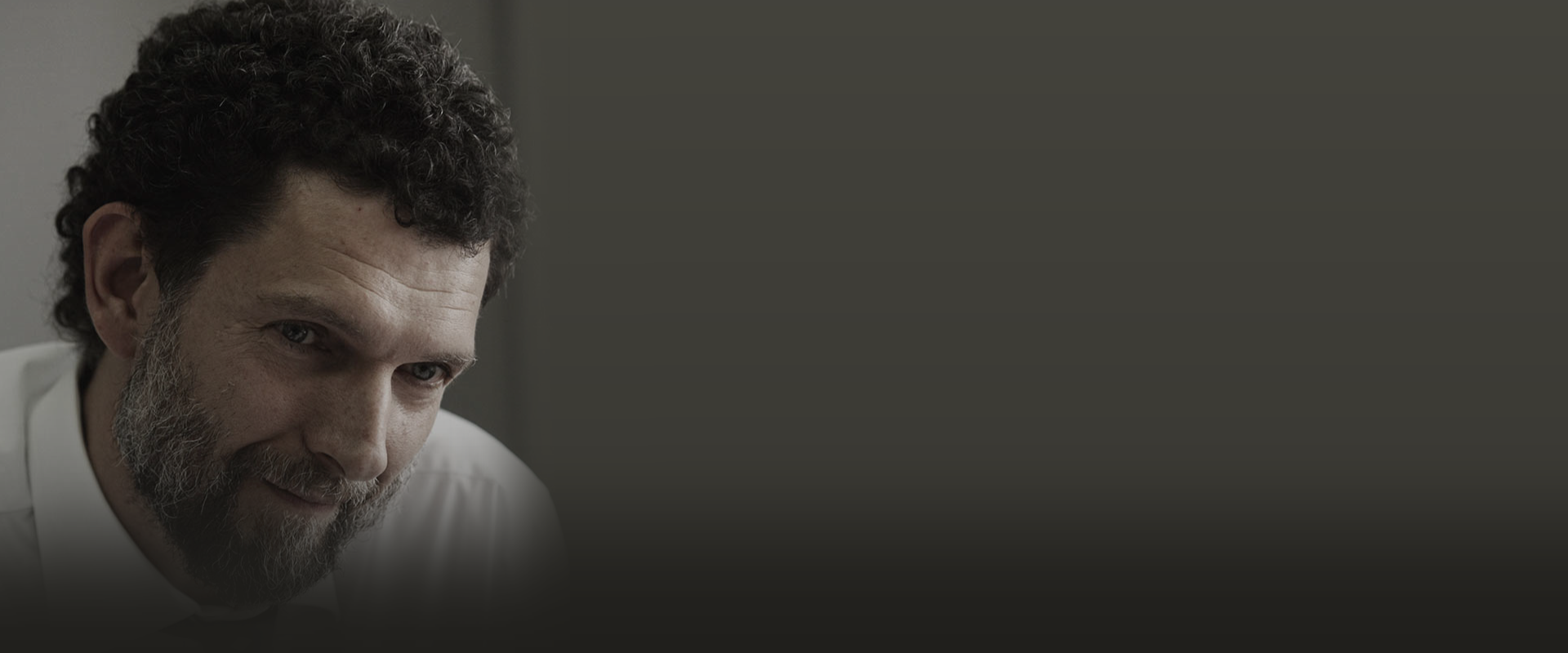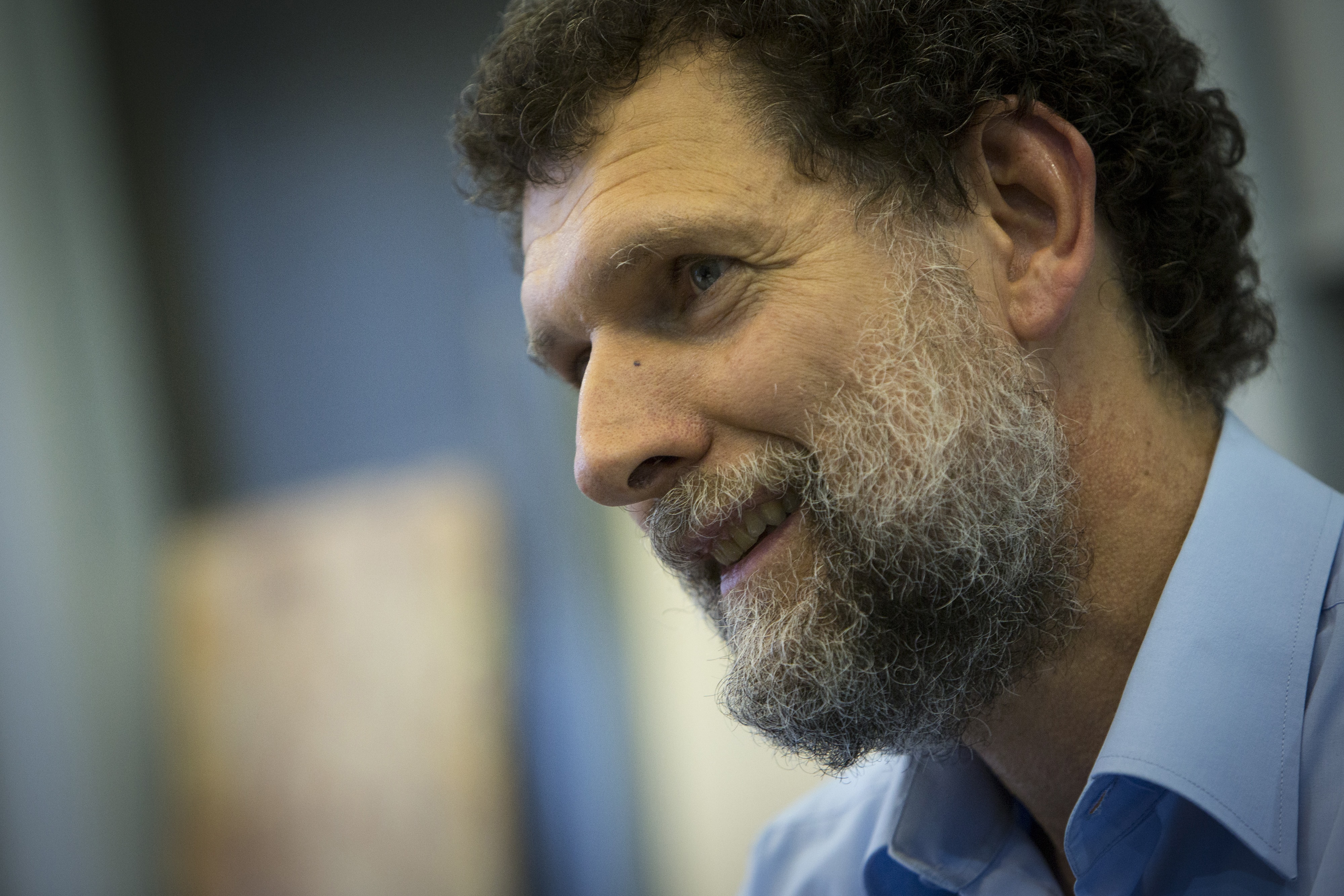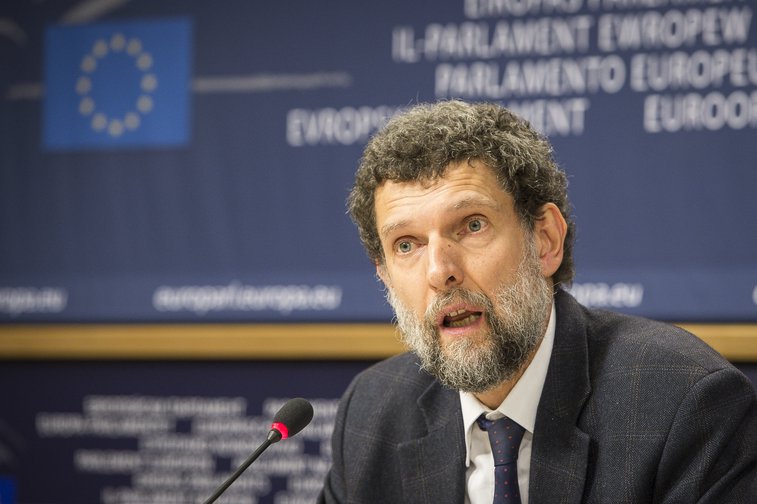
Osman Kavala
"Writing about some people, you think, is easy. You think it is easy to write about what is good, about what is beautiful. In fact, that is not the case. Especially if he is a person who is completely distinguished by being good and beautiful."
Nurcan Kaya, on the occasion of Osman Kavala’s birthday on October 2nd , 2019Biography
Osman Kavala is one of the main funders of civil society in Turkey. Born in Paris in 1957, he has been living in Istanbul for most of his life. He studied economics in Manchester. In 1982, following the death of this father, Osman Kavala took over the family business, Kavala Companies.To strengthen democratic culture in Turkey, especially in view of the military coup 1980, Kavala supported the publishing house İletişim, which until now is one of the most important book publishers in Turkey with a focus on political, historical and sociological issues.
A turning point in Kavala’s life was reached following the fatal earthquake in Gölcük in 1999, when he was heavily involved in organizing solidarity and emergency networks to help victims of the disaster. He decided to give up his business activities in order to focus entirely on fostering civil society. He has been a major supporter of initiatives and associations promoting freedom of speech, activities for peace, mutual understanding, minority and refugee rights and similar issues.
Kavala is also the founder of the Anadolu Cultural Foundation/Anadolu Kültür Vakfı, operating in the above mentioned fields, especially promoting mutual respect through arts and culture.
Kavala and the initiatives supported by him touched on sensitive issues of the Turkish Republic, e.g. the Armenian genocide or the Kurdish issue. Therefore, Kavala has always been a target of the Turkish government and fanatic nationalists, just like many other intellectuals, artists and dissidents. On October 18, 2017, upon his return from a meeting with staff of the German Goethe Institute in Gaziantep, Osman Kavala was arrested at the airport in Istanbul. First, he was accused of having dealings with the Gülen Movement (now called FETÖ - Fethullahist Terror Organization by the Turkish authorities), later he was identified as the master mind behind the Gezi uprising in the summer of 2013, allegedly conspiring with various international organizations acting upon a secret agenda to overthrow the Turkish government. To this day, Kavala is detained without charge.


Seeking for Justice
Statement by Osman Kavala upon completion of his 2nd year in prisonI am at the end of my second year as a resident of Silivri, striving to make it through these tormenting times as unscathed as possible thanks to the support of my wife, family and friends.
Seeing my neighbours, acquaintances released from prison during my time here lightens my heart. I am more than happy that my neighbour across the hall, Eren Erdem, is finally out. Coming back to our case, three hearings have gone by. Court arguments have, to my understanding, made it clear enough that the charges have no evidential basis, those standing accused have done nothing to incite violence, and have no organizational affiliation to each other.
Defence attorneys have revealed that this indictment, with its very conception, extrajudicial telephone taps and informants’ letters is based on the work of police officers and prosecutors under charges of Gülenist activities.
Read More
In view of the absurd accusations made against Osman Kavala by the prosecutor's office in the Gezi trials, Osman Kavala commented on this in his defence speech at the main hearing on 25 June 2019. In the following we reproduce passages from his defence.
"The accusations brought against me, which constitute the grounds for my pre-trial detention over the past twenty months, are based on a number of factually unfounded allegations against logic as well as presumptions that are not corroborated by evidence. Factual events have been distorted and a fantastic fiction has been constructed.
The indictment establishes that the Gezi Events were plotted by George Soros as an insurrection aiming to overthrow the Government, that in accordance with this plot the Gezi Events were financed by Soros, that I took part in the preparation phase of this plot, that I channelled Soros funds to the Gezi Events, that I acted as the leader and organiser of the Gezi Events.
The indictment reads as follows: "It has been understood that the entity led and coordinated by Mehmet Osman Kavala in our country,...prepared the ground for illegal structures and armed terrorist organisations to act; aimed to force the Government of the Republic of Turkey to resign by exerting pressure through this atmosphere and foreign countries; contemplated use of weapons and kept secret weapons readily available for preparing the ground for civil war, in case all the previous attempts would fail". This is an extremely degrading and humiliating accusation.
(…)
Throughout my entire life, I have never ever sympathized with the idea of change of power through methods other than free elections. Since the early 1980s, when I became actively engaged in business, I have tried to realize projects and investments that I believed were important, and strived to contribute to a culture of democracy and to the cultural life of our country."
(…)
The Gezi Events comprise a multitude of actions and activities undertaken by various groups and individuals in different cities and venues. Gathering and camping at the Gezi Park for the purpose of halting the construction project; protest actions against the use of force by security forces as well as the government decisions; open-air forum discussions and closed meetings held to reflect on all that happened during the process and to evaluate the social dynamics are altogether considered as the Gezi Events.
People who took part in these various activities during the Gezi Events may have different opinions about the goal and outcome of these events. It is quite understandable that there may also be differences in views and assessments about the events.
(…)
As I have tried to explain in my testimony and the petition where I provided additional information, upon Mr. Erdoğan's 4 February 2013 statement that ''Gezi Park will be replaced by a shopping mall'', I did make efforts to convince the government and the public about the fallacy of this project and to ensure that the Gezi Park remained and be preserved as a park. I did take part in the Taksim Platform. I was at the Gezi Park; I personally supported landscaping and planting activities at the park. Besides, as was also mentioned in the indictment, I took part in the meetings with Government officials. I cannot comprehend the logic of a person who talks to Government officials in an effort to find comprise between the protestors and the Government preparing the grounds for a coup by fomenting chaos and turmoil.
(…)
As I have already mentioned, apart from being a businessperson, I have been active in civil society for many years. Throughout this period, there were times when we cooperated with government agencies on various projects; there were also times when we criticised the practices of the governments and its agencies, when we tried to make a change in such practices.
(…)
Yet, certainly, I feel a deep pain for the lives that were lost and for the people who were injured during the Gezi Events. I also feel sorry about the material grievances suffered. For all the reasons I have explained above, I would like to stress that I am no different than hundreds of thousands of people who got involved in the Gezi Events peacefully - both in terms of intent and action, and I demand my release and acquittal."
For the full defence speech of Osman Kavala please click here.
His Work and Engagement
After graduating in Economics from Manchester University in 1982, Osman Kavala took over the family-owned enterprise Kavala Group. Totally committed to the family business, Osman Kavala was at the same time deeply attuned to cultural forces affecting Turkey. In response to the oppressive atmosphere in the aftermath of the military coup on September 12, 1980, he was involved in the foundation of İletişim Yayınları (İletişim Publishing Company) in 1983. The mission of İletişim Yayınları was to carry out effective, extensive and popular publishing activities serving the democratization of political life in the country. In the following years objectives such as cultural diversity and dialogue in arts and culture became the cornerstones of his activities.After partaking in relief action in the aftermath of the 1999 earthquake, he quit the business world to dedicate himself to the civil society. He became one of the most important advocates in Turkey’s developing civil society during the 1990s, working in a variety of organizations and projects. In 2002, he decided to focus on arts and culture and founded Anadolu Kültür together with a team of like-minded people from the arts, business and civil society. The group’s objectives included enabling the production, viewing and sharing of arts and culture in Turkey, supporting local initiatives, emphasizing cultural diversity and rights and strengthening local and international collaboration. Anadolu Kültür aimed for creating a peaceful society.
For the full article about Kavala’s work and engagement please click here.

